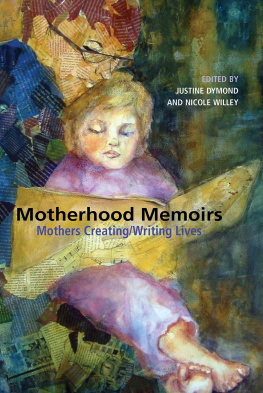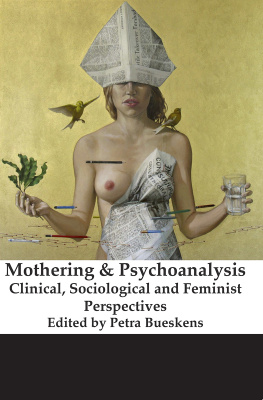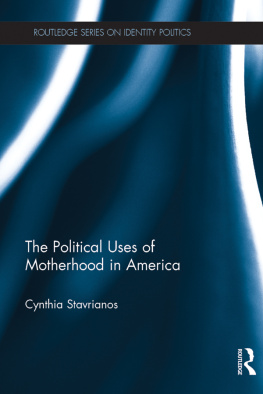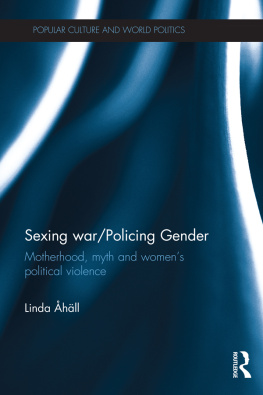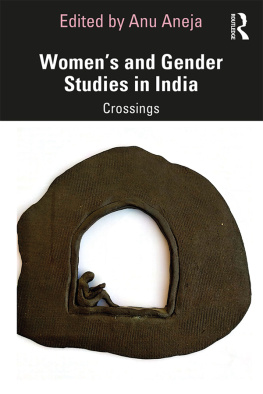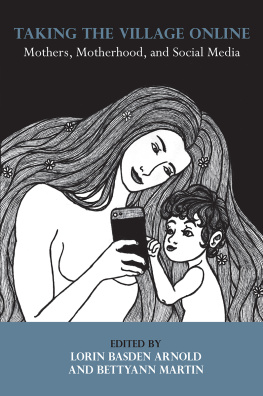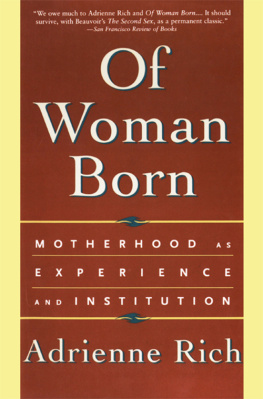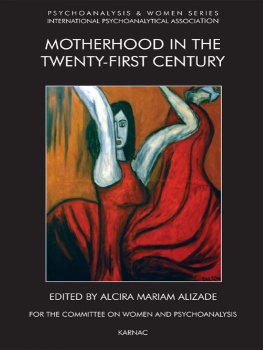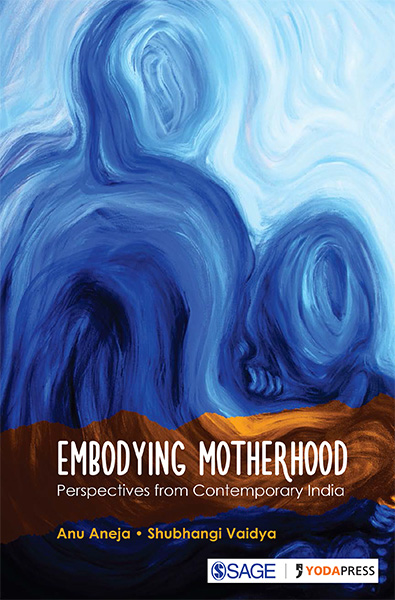
EMBODYING MOTHERHOOD
EMBODYING MOTHERHOOD
Perspectives from Contemporary India
Anu Aneja and Shubhangi Vaidya

Copyright Anu Aneja and Shubhangi Vaidya, 2016
All rights reserved. No part of this book may be reproduced or utilized in any form or by any means, electronic or mechanical, including photocopying, recording or by any information storage or retrieval system, without permission in writing from the publisher.
First published in 2016 by

SAGE Publication India Pvt Ltd
YODA Press
B1/I-1 Mohan Cooperative Industrial Area
268 AC Vasant Kunj
Mathura Road, New Delhi 110 044, India
New Delhi 110070
www.sagepub.in
www.yodapress.co.in
SAGE Publications Inc
2455 Teller Road
Thousand Oaks, California 91320, USA
SAGE Publications Ltd
1 Olivers Yard, 55 City Road
London EC1Y 1SP, United Kingdom
SAGE Publications Asia-Pacific Pte Ltd
3 Church Street
#10-04 Samsung Hub
Singapore 049483
Published by Vivek Mehra for SAGE Publications India Pvt Ltd, typeset in Berkeley 10/12 pt by Zaza Eunice, Hosur, Tamil Nadu, India and printed Chaman Enterprises, New Delhi.
Library of Congress Cataloging-in-Publication Data Available
ISBN: 978-93-515-0893-9 (HB)
SAGE YODA Team: Sonjuhi Negi, Neha Sharma and Ishita Gupta
To
our mothers,
for embodying us
our children,
for opening up remarkable motherhood chapters in our lives
and to both,
for their faith in our capabilities beyond mothering
Thank you for choosing a SAGE product!
If you have any comment, observation or feedback,
I would like to personally hear from you.
Please write to me at
Vivek Mehra , Managing Director and CEO, SAGE India.
Bulk Sales
SAGE India offers special discounts
for purchase of books in bulk.
We also make available special imprints
and excerpts from our books on demand.
For orders and enquiries, write to us at
Marketing Department
SAGE Publications India Pvt Ltd
B1/I-1, Mohan Cooperative Industrial Area
Mathura Road, Post Bag 7
New Delhi 110044, India
E-mail us at
Get to know more about SAGE ,
Be invited to SAGE events, get on our mailing list.
Write today to
This book is also available as an e-book.

Contents
Chapter 1
Disembodied Mothers: Re-writing the maternal metaphor through goddess iconography
Anu Aneja
Chapter 2
Anticipating the Mothers Dream: Maternal subjectivity in psychoanalysis, literature and cinema
Anu Aneja
Chapter 3
Mere Paas Maa Hai Reflections on representations of motherhood in Hindi cinema
Shubhangi Vaidya
Chapter 4
More than a Mother: Autism, motherhood discourse and lived experience
Shubhangi Vaidya
Chapter 5
Capitalist Encounters: The motherhood pact
Anu Aneja
Chapter 6
Of Unfit Mothers: Disability, stereotypes and contestations
Shubhangi Vaidya
Chapter 7
Mapping the Mother in France and India: Discursive revolutions
Anu Aneja
T his book is a labour of love. It was conceived as the result of an ongoing conversation between the authors, both of whom were in the process of thinking through the ideological implications of mothering in terms of the lived realities of their personal lives as well as their academic and intellectual pursuits. In some ways the final product is evidence of our common recognition of the interconnections between these domains, denying a clear-cut separation between the two. Our deep investment in feminist understandings of the experience of mothering has been a way of confronting one crucial aspect of our lives. Equally, it has provided us a lens with which to view and explore its symbolic mutations and re-conceptualizations and to visualize pathways beyond the apparent and commonly shared patriarchal discourses within which we remain embedded. Deeply aware of the essentialist debates within feminist academic discourses, owing to which motherhood continues to occupy a contested space, we wished, at once, to interrogate oppressive and regulatory maternal ideologies and their attendant notions of able mothering, as well as to explore liberatory aspects unleashed through revised understandings of the maternal. The dual impulse to question patriarchally constructed motherhood roles and to uncover in altered reconceptions of the maternal a freedom beyond settled perceptions remains at the heart of this enterprise. It is the latter desire that has impelled us to delve into the maternal beyond the merely corporeal, in its various metaphorical embodiments in religious iconography, literature, cinema, psychoanalysis, and beyond.
We would like to acknowledge the contributions of and support offered by the many people who have been an integral part of this process. We are deeply indebted to Arpita Das of Yoda Press for her wholehearted enthusiasm from the very outset of this project. Her faith in the manuscript and her unstinting support through the various phases of the editing process, have been invaluable in sustaining our commitment and ensuring the timely completion of the manuscript. We are also grateful to other members of Arpitas editorial team. For her efficient and meticulous copyediting, her keen eye, and for candidly declaring her pleasure in working with the manuscript, we would like to offer a big thank you to Sonjuhi Negi. For providing assistance in the early part of this process, we thank Nishtha Vadehra. We thank the anonymous reviewer who went through the draft manuscript for generous and encouraging feedback. We are delighted that our work forms a part of the new SAGE Yoda imprint and extend our thanks to SAGE for their support.
For their prompt assistance and their permission to use several of the images that appear in the book, we would like to acknowledge the National Museum, New Delhi; CIViC: Centre for Indian Visual Culture, New Delhi; Patna Museum, Bihar; as well as Christopher Pinney, Priya Paul and Christiane Brosius for sharing images from their respective private collections.
We are thankful to Demeter Press and to the journal Social Change (published by SAGE) for allowing us to reprint materials that have previously appeared in their publications. We are grateful to the Indira Gandhi National Open University, and especially the IGNOU Library, for providing us a space within which this research could be accomplished. We deeply appreciate the very willing and personalized support provided by Dr Jaideep Sharma, Head Librarian and Dr Syed Nehal Imam of the IGNOU library, both of whom have always shown an ongoing readiness to help locate valuable resources, and have often gone out of their way to do so. Teaching courses in gender and writing study materials for distance learners has helped us to clarify and refine our ideas and theories. We warmly thank our colleagues in the School of Gender and Development Studies and the School of Interdisciplinary and Trans-Disciplinary Studies, IGNOU, for providing lively, collegial spaces for debate, discussion and mutual learning and for keeping alive ongoing conversations about various gender-related issues. For her valuable and very prompt feedback on parts of the manuscript, we are grateful to Dr Meenakshi Malhotra. We have, over the years, had the great good fortune to interact with eminent scholars, activists and stake-holders in the womens movement and the Disability Rights movement who have enriched our understanding and sensitized us to the often brutal realities experienced by women in general and women with disabilities in particular.


